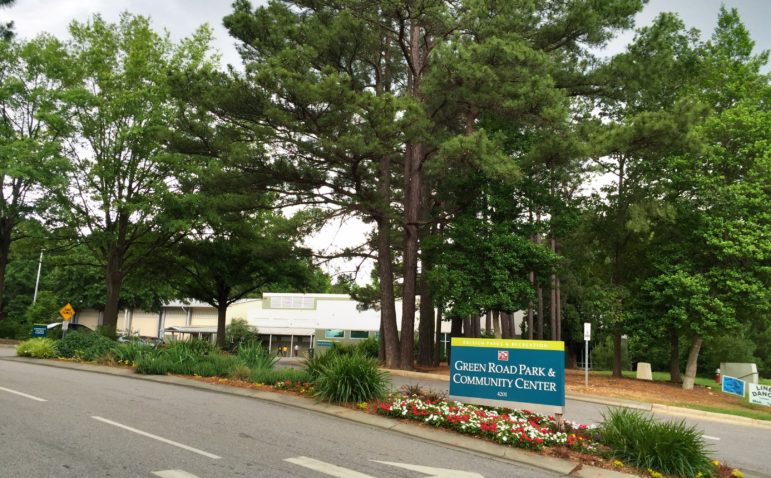Charity Van Horn wasn’t there the night her neighbors nominated her to chair the relatively new, year-and-a-half-old Atlantic Citizens Advisory Council.
It was perhaps fitting then that Van Horn, who now has a son about as old as the CAC was when she signed on as co-chair, was absent from the May 2016 meeting that saw the nomination of two potential successors for her position.
After nearly three years of serving as the Atlantic CAC’s co-chair, Van Horn isn’t burned out and she’s certainly not being forced out: it’s something much worse. The Van Horn family — Charity, her husband Derek and their son Alexander — is moving to Wake Forest.
May 19, the date of the most recent Atlantic CAC meeting, was also the family’s first day in their new Wake Forest home. Ms. Van Horn was gracious enough to take a break from unpacking to speak with The Record about her experiences co-chairing the CAC.
Being the Change You Want to See

Derek Van Horn
Charity Van Horn
Charity Van Horn first moved into the Pine Knoll neighborhood in North Raleigh off Capital Boulevard in 2006, when she was working as a fourth-grade teacher. After marrying in 2009, Van Horn and her husband began to get involved with the homeowners association and eventually started a neighborhood watch program.
“We had chili in our front yard, apple cider, cornbread,” Van Horn said of the inaugural 2011 get together for the neighborhood watch.
“30-40 people came by, it was really powerful, because people met with their across-the-street neighbors; ‘I know you, you have the red Honda'” Van Horn said.
“And you’re thinking, you’ve lived here for there years and you’ve never met? Part of that is because a lot of people have garages, and we don’t spend time on our front porches like we used to.”
When the Atlantic CAC was formed in February 2012, Van Horn and other members of other local neighborhood watch groups were invited out. It was her reputation for working in the neighborhood and getting things done, Van Horn said, that eventually led to her nomination for chair the following summer.
“My neighbor came up to me and said, ‘I hope you come out next month, we’re voting and you were nominated,'” Van Horn said.
“I was like, I don’t know if I want all this, but what happened, I knew Mark [Rakes] from Brentwood, I thought it was too much work to do myself, but he agreed to co-chair it with me.”
Initially, Van Horn said she was worried about finding enough speakers for their monthly meetings, although the CAC oversight board, the RCAC, often helps with that by helping to make available City staff and other members of the community who wish to speak out on a particular issue.
While she estimated that about 60-75 percent of the speakers come to them, Van Horn said she will fill the rest of the agenda, which she prepares at least two months in advance, by finding people willing to speak on a particularly topical issue.
She cited the City’s ongoing debate on whether to legalize Airbnb rentals as one such example.
“A year or so ago there was a group that was advocating for standards and regulations for room rental services,” Van Horn said.
“So recently I went onto Airbnb, and I reached out to some of the hosts on there saying, we want to talk about this issue, but we don’t have any experience with it.”
Van Horn said there are a number of regular attendees of the Atlantic CAC who may not be familiar with the concept and unsure what effect it could have on the neighborhood.
“I feel like most people wouldn’t necessarily see what can be good about [legalizing Airbnb] so I’d love to have some people out who are renting to say, here’s what we love about it, here’s what we’re worried about.”

James Borden
The Atlantic CAC holds monthly meetings at the Green Road community center
Van Horn estimates she only spends about four hours, the meeting included, on CAC business a month. In a broader sense, she hopes to facilitate discussion between neighbors, and between neighborhoods and the City as a way of coming together to resolve common problems.
“It’s very easy to complain,” Van Horn said.
“But I am the queen of ‘Be the change you want to see’ — don’t show up week after week and say ‘This is a problem!’ unless you’re willing to be part of the solution.”
Ultimately, Van Horn said she viewed her role as that of a facilitator.
“What invigorates me is when I watch people who just showed up get engaged because I functioned as a liaison; I feel like the coupling between two train cars, and when I see those two latched in place and I’m not necessary, that’s the most invigorating thing.”
Citizens Advisory Councils: A Raleigh Tradition for More Than 40 Years
Citizens Advisory Councils were first established in Raleigh in 1974. Then Mayor Clarence Lightner had this to say in February of that year.
“The City Council will make resources available to you to do the type of job that has been assigned to you. We feel that this can be a beautiful process, if you so choose, or it can be just another complaint board, and we as City Council Members do not need that kind of board. Certainly we would like for you to bring your problems to us, along with alternative solutions and recommendations to solve these problems.”
Three main goals were established for the original 18 CACs (there are now 19). These included educating the public about government affairs, providing a way for neighborhoods to communicate with the government and creating a way for neighborhoods to be involved in the development of future plans and projects.
Beverly Taylor has been involved with the CACs since their inception, and was the recipient of the 2015 Neighborhood Recognition Award from the Atlantic CAC. She also serves as its secretary.
Although neighborhood involvement has long been a passion of Taylor’s, she said she was reluctant to ever take on an officer’s role.
“I’m not a leader, just a follower, I do all kinds of stuff.”
All that “stuff” is what earned Taylor the recognition award, and, care of Rakes, the nickname “Popcorn,” which came about after she volunteered to work concessions at a neighborhood event.
Despite her long history with the CACs, Taylor said something about the Atlantic CAC under Van Horn really stood out for her.
“She’s made it so exciting; it can almost be hard to keep up with her!”
One interesting thing to note about the make up of the CACs: From the original 18, Falls of Neuse and Six Forks were merged into the Midtown CAC, which was founded in February 2012. The other two CACs created that year were Atlantic and Forestville.
Admission to a particular CAC is granted automatically upon moving into Raleigh: the initial goal was to have each council serve between 7,000-14,000 residents. In 2014, Raleigh’s population was estimated to be just shy of 440,000. That means each of the 19 CACs serve, on average, about 23,000 residents.
Attendance at the Atlantic CAC’s monthly meetings, which tends to range between 20-25 neighbors, is about on par with attendance at CACs citywide.
Controversy can inflate those numbers: a crowd of about 50 turned out to a recent meeting of the West CAC to discuss a new Christian Pregnancy Center, and more than 500 people turned out to vote against a proposed shopping center off Falls of Neuse in North Raleigh in 2014.
David Cox, who was elected to City Council in November 2015, led the 2014 charge against the shopping center as a neighborhood advocate.
In an interview with The Record last month, Cox speculated that the turnout for the June 2014 North CAC — where the vote was 522-23 against the shopping center — had set some kind of record.

James Borden
David Cox at the May 2016 meeting of the Atlantic CAC
As there are more CACs than there are City Council districts, Cox is a regular presence at several of them, including Atlantic. At its most recent meeting, he was on hand to provide an update on a nearby construction project and field complaints from neighbors about traffic problems in the area.
For Councilor Cox, who ran on a platform of communicating with and representing the interests of all of his neighbors, the CACs provide a great opportunity to regularly meet his constituents face-to-face and hear their concerns directly, an effort that does not go unappreciated by those in attendance.
Jeanine Inskeep, who was nominated as one of Van Horn’s potential replacements, said she really appreciated how accessible Cox had made himself.
“David’s awesome,” Inskeep said.
“I’m Not Replacing Charity, No One Can”
Following the presentation on the Raleigh Boys and Girls Club at May’s Atlantic CAC meeting, co-chair Mark Rakes began the process of choosing a successor for Van Horn.
“We’re looking for some people to help out in the leadership here,” said Rakes, who added that he will remain in his position as co-chair for the foreseeable future.
“I’m not replacing Charity,” Rakes said. “No one can.”
Although Van Horn estimated that both she and Rakes spend about the same amount of time working on CAC business each month, Rakes joked this was probably only because she was able to work much more efficiently than he was.
One of his duties, he said, is to attend the monthly RCAC meetings held downtown in the City Council chambers, which are almost always scheduled the night before the Atlantic CAC’s monthly meeting.
At May’s meeting of the RCAC, the council discussed an ongoing plan to get the CACs more involved in the rezoning process, by having the developer reach out to them, along with surrounding property owners, when they first begin working on a case.
City Councilor Russ Stephenson also made an appearance to talk about a proposed text change and the new Council committees that had been formed earlier this year.
Rakes, who works for the City’s Public Utilities department, said while he always appreciates the new information learned at these meetings, they aren’t necessarily his favorite part of being a CAC co-chair.
“It’s a boardroom atmosphere; I’m used to turning wrenches,” he said.
Rakes said for him, the most rewarding part of being involved with the CAC is getting to work with and help his neighbors.
“If people have been calling about a problem with their water bill, or there’s a stormwater issue, we’re able to tell them who to go to, and occasionally that person might even be at a meeting. I like to push Parks and Rec there, especially the Green Road Community Center,” he said.
Outside of his role as co-chair, Rakes helps out and spends time with a number of the senior citizens who live in his neighborhood.
He was inspired at a young age by his grandfather, who “had a huge old vegetable garden, and he used to cook for churches, and widows and take raw vegetables out to people.”
“You don’t regret doing the things you know are right; everything can be taken away from you except what you’re willing to do to help other people,” Rakes said.
For his part, Rakes intends to keep helping out with the CAC as it brings on new officers. He hopes to bring in as many of them as possible, saying that even if not everyone who runs gets to serve as an officer, “there’s no loser here,” as everyone has a role to play in making their community a better place.
At the May meeting, Rakes made two nominations for co-chair: Shelley Winters, a neighbor of Van Horn’s who lives in Pine Knoll, and Jeanine Inskeep from Homeplace.
Inskeep said she began coming to the Atlantic CAC meetings out of a sense of frustration that none of her neighbors cared to address any of the problems in the area.
Although she had been involved in starting a community watch organization in her old neighborhood, Inskeep said she was unable to replicate that in Homeplace.
Since she started coming to the meetings, however, she said she’s noticed a number of minor but significant improvements in her neighborhood, including a new gate that prevents people from driving onto a vacant, wooded lot.
She agrees with Van Horn that it takes a lot more than complaining to address problems within a community.
“If you don’t get out there and get involved, nothing happens. Sitting back and complaining about it doesn’t get you anywhere.”

James Borden
The Green Road Community Center
